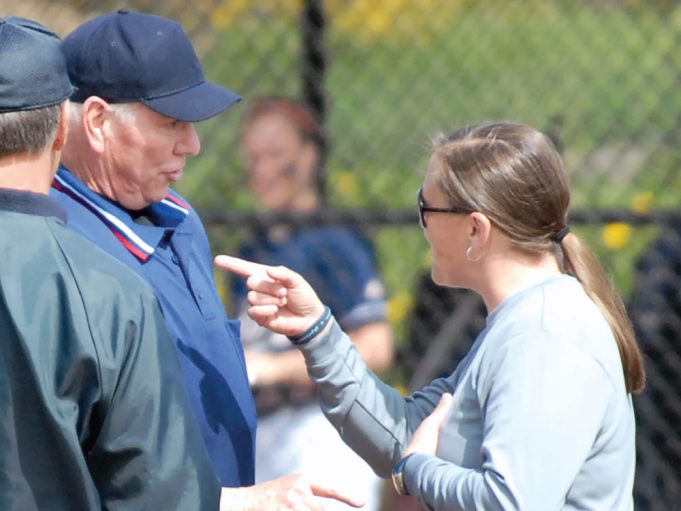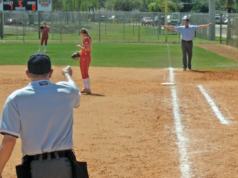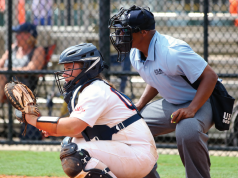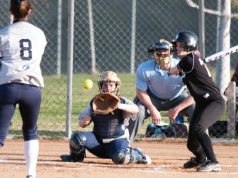There’s a nationwide shortage of officials. It’s gotten harder in all sports to get and keep officials, and softball is no exception. Criticism from players, coaches and fans is a constant. How you handle that feedback goes a long way in determining how effective you’ll be as a game manager and the level of enjoyment you’ll get from umpiring.
The NCAA has tried to help with the implementation of rule 13.8.4, which makes it illegal for a coach, player or team to “question the strike zone and any call based purely on umpire’s judgment.” The penalty is a team warning issued for the first offense in a game, while subsequent violations by the same team result in a behavioral ejection of the violator(s). The NFHS (3-6-15), USA Softball (4-8c) and USSSA (11-2R) have basically the same rule.
Coaches may ask questions about a possible “pulled foot” or “bobbled ball,” but can’t question bang-bang calls or borderline pitches. Also, the NCAA has given umpires more flexibility in giving information to a partner when they are 100 percent sure they saw something their partner missed without waiting to be asked. This should help alleviate obvious missed calls.
I originally liked the “no questioning judgment” on balls and strikes as it took away a lot of the complaining and whining on both sides when a coach or player didn’t like how a pitch was ruled. I always wondered how basketball officials put up with the coaches’ constant complaining that seems to be an accepted practice as “working the officials” in order to get future calls to go in their favor. Most college softball umpires I have worked with give coaches some leeway on questioning borderline pitch calls. The NCAA wants some pitch location questions to be allowed so as not to warn and/or eject coaches at the slightest remarks.
Which brings me to the addition of the “and other judgment calls” to the rule. I understand the NCAA wanted to stop the constant timeouts and delaying of games with coaches coming out to question every close play. But I think the association went too far. Coaches are emotionally involved and really think every close call should go in their favor. They work very hard and want their players and teams to succeed and will naturally show emotions when a close call goes against them. As a former coach, I think it is unfair to ask them to remain stoic and emotionless. In one breath, the NCAA wants its umpires to be “approachable,” but then has a rule stating umpires can’t have their judgment questioned. Seems contradictory.
I decided that besides enforcing the constant questioning of my strike zone with a quiet conversation with a warning, I would only use the new part of the rule in situations that dealt with illegal pitches and leaving early.
The penalty for illegal pitches used to be so severe (advancement of a base for all runners and a ball on the batter) that some coaches harped on it incessantly. Because the pitcher gets the benefit of the doubt once I decided she wasn’t illegal, I didn’t want to hear constant chirping about it. So, I would use the no-questioning-judgment rule to end coaches’ complaining. With the illegal pitch changed so that the only penalty was a ball to the batter, there should be far less scrutiny and remarks about illegal pitches.
As far as leaving a base early, the runner gets the benefit of the doubt. I would get tired of coaches complaining “she left early” on every leadoff whether or not the runner was stealing. That was especially true with two umpires, who have a bad angle to make the call. I would tell coaches they probably had a better angle than I have to make the call, but I’d still watch for it. I also turned my head slightly toward the runner in my set position to address coaches yelling, “You’re not even looking for it.”
On all other close plays, I did give coaches some leeway on coming out and questioning me. I felt like it was their right and responsibility to show their team and fans that they wanted that close call to go in their favor. I just made sure it didn’t last too long and wasn’t a constant occurrence.
The players I encountered didn’t complain all that much. You may get an occasional glance or look, but for the most part they just play the game and accept your calls. Of course there are exceptions and they have to be dealt with immediately. Most coaches are also decent to work with. The coaches I struggled with the most were the summer coaches. Many didn’t know the rules very well and got frustrated with their teams’ poor play. Berating the umpire was their release.
In the last few years, I noticed more inappropriate comments coming from the stands during the college games. In one case, a group outside the outfield fence was yelling crass comments to try to distract the outfielders while the ball was in play. There have been many times I wished I could turn around and address a constant complainer or heckler in the stands. The nice thing in the NCAA is having an on-site administrator who is charged with taking care of such problems.
Compared to other sports, softball is pretty tame when it comes to arguments. Part of that is because of the rules put in place to curtail complaints and arguments.
All things considered, softball should be one of the most enjoyable sports to officiate. It helps to know there are rules that restrict questioning and arguing by players and coaches. Treat all other comments as unheard or don’t react to them.
What's Your Call? Leave a Comment:
Note: This article is archival in nature. Rules, interpretations, mechanics, philosophies and other information may or may not be correct for the current year.
This article is the copyright of ©Referee Enterprises, Inc., and may not be republished in whole or in part online, in print or in any capacity without expressed written permission from Referee. The article is made available for educational use by individuals.


















